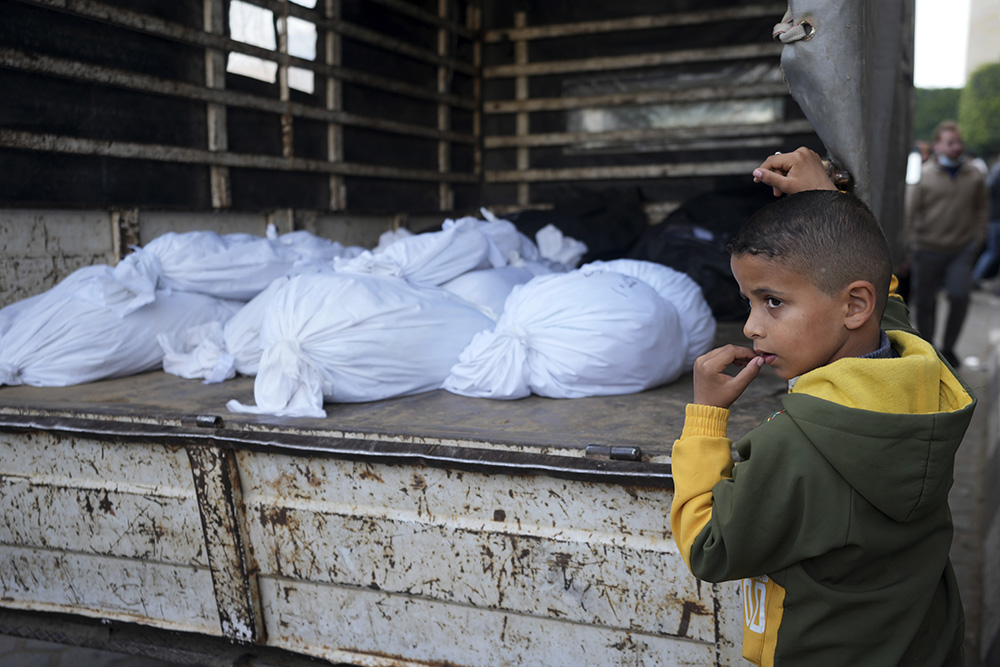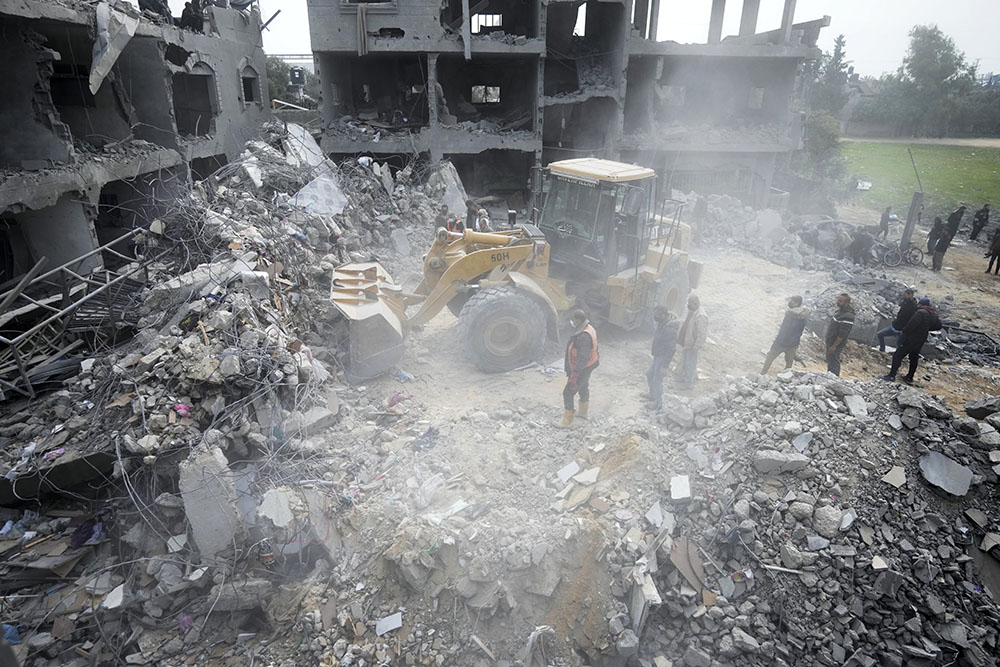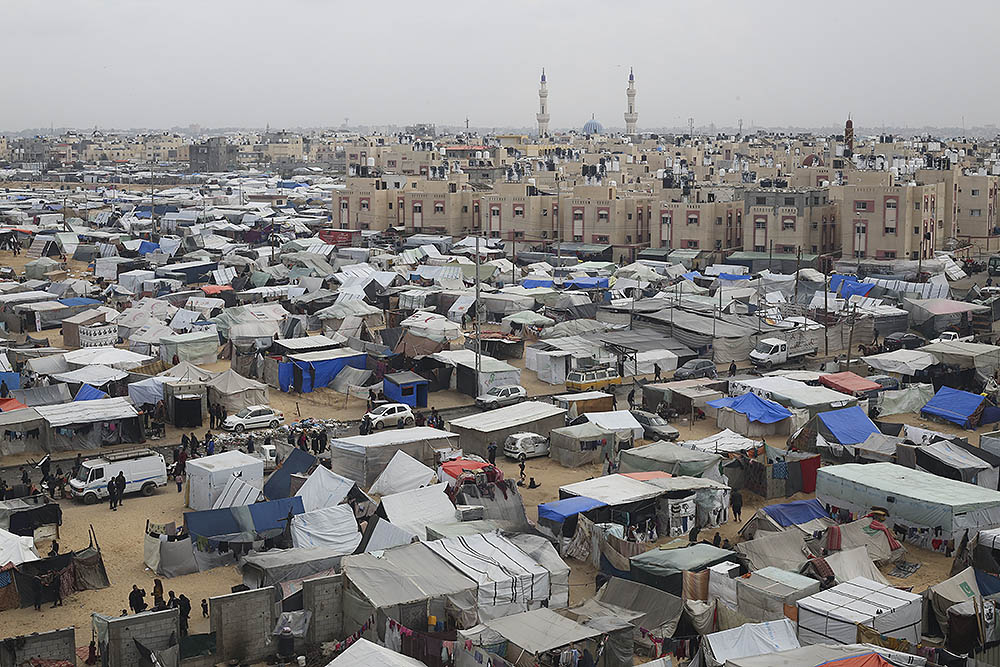
A Palestinian boy stands by the bodies of relatives killed in the Israeli bombardments of the Gaza Strip in front of the morgue of the Al Aqsa Hospital in Deir al Balah Feb. 24. (AP/Adel Hana)
See this reality: more than 29,000 Palestinians killed, nearly 70% women and children; patterns of torture by Israeli soldiers; Israeli hostages killed by their own military; a 6-year-old girl killed pleading for help in a car; a Palestinian Christian mother and daughter shot by a sniper; a "plausible" genocide, according to the International Court of Justice; a mass invasion of Rafah in the crosshairs (March 10 deadline given); generational trauma; and the seeds of bitterness for likely ongoing cycles of violence.
Cardinal Pierbattista Pizzaballa of Jerusalem has been constantly crying out for a cease-fire, as have Pope Francis and Palestinian Christians, and even more recently the head of the U.S. Conference of Catholic Bishops, as well as Cardinal Robert McElroy of San Diego and Archbishop John Wester of Santa Fe, New Mexico.
The Rev. Munther Isaac from Bethlehem cries out:
If we, as Christians, are not outraged by this genocide, by the weaponizing of the Bible to justify it, there is something wrong with our Christian witness, and compromising the credibility of the Gospel! ...
In our pain, anguish, and lament, we have searched for God, and found him under the rubble in Gaza. Jesus became the victim of the very same violence of the Empire. He was tortured. Crucified. He bled out as others watched. He was killed and cried out in pain — My God, where are you?
In Gaza today, God is under the rubble.
And so I have felt deeply distressed encountering Catholic arguments — from politicians to commentators — for sending more destructive weapons to Israel, which would continue this mass slaughter. Most Catholic Congress members, and of course our Catholic president, fall into this category. This is in the context of relative silence by too many other Catholic leaders across various sectors of society.

Palestinians search for survivors after an Israeli airstrike on a residential building in Deir al Balah, Gaza Strip, Feb. 23. (AP/Adel Hana)
This logic of war and relative silence doesn't arise in a vacuum. It is often a process of seduction. The seduction may arise in part from the myth of redemptive violence, that security is simply rooted in militarism, and for others nationalism.
Many arguments for more weapons to both Israel and Ukraine are based on the distorted logic that the "right to defense" must primarily mean lethal, mass militarized defense. Yet, where does this logic and strategy get us?
Hundreds of thousands are dead in Ukraine, massive generational trauma, millions of refugees and internally displaced persons, rampant dehumanization, and the perpetuation of cycles of violence.
For those swept up in or seduced by this distorted logic, the more recent escalation in Israel then seems like just another obvious moment for the same strategy. Hamas committed horrible violence on Oct. 7. (Netanyahu's strategy to prevent a two-state solution has been to prop up Hamas).
Yet, war is not accountability. Retribution is not accountability. War is trauma, not justice. And the Palestinians have been living for years under siege, occupation, and apartheid.
The primary public message from U.S. leadership was Israel has a "right to defend itself," which meant here a justification for a military strategy of violence. Days into the violent response, thousands of Palestinians were killed, including in the bombing of hospitals, schools, religious sites, refugee camps, etc. Food, water and electricity were cut off and dehumanizing rhetoric from Israeli leadership increased.
U.S. leadership continued to justify military violence while also encouraging Israel to follow international law and try to protect civilians. Yet, weeks into the violent response, more than 10,000 Palestinians were killed with 67% being women and children, and 80% of the population displaced.

A tent camp housing Palestinians displaced by the Israeli offensive is seen in Rafah, Gaza Strip, Feb. 27. (AP/Hatem Ali)
So, U.S. leadership shifted somewhat to try to encourage humanitarian aid, negotiated a humanitarian pause and the exchange of some prisoners, yet still justifying violence by blocking U.N. resolutions for a cease-fire and continuing to send weapons to Israel. Nearly five months in, now we have nearly 30,000 Palestinians killed.
Calls for the Israeli government to follow international law or the rules of war or to use proportional violence are at best inadequate, and at worst enabling. Even if it did, the war would continue, and many civilians and others will still be killed; trauma and cycles of violence will still be generated.
In fact, the U.S. has called on Israel to do this many times over the multiple invasions into Gaza since 2005 and Israel has a clear track record of rarely following such rules.
Jesus sets aside and calls us beyond the logics of proportional violence (Matthew 5 and 26), in large part because it generates cycles of trauma and violence.
It is critical that Catholics take a stand and with Jesus say, "Enough!" (Luke 22). Part of this "enough" is focusing on breaking the dynamics of violence, which normally means alternative methods to violence.
Part of this "enough" is focusing on just-peace moral reasoning, particularly since most decision-makers and analysts claim they seek a just peace. We can't just perpetuate mass slaughter and then throw in a line that we intend or "seek just peace."
We must turn to strategic nonviolent peace-building to interrupt the cycles of violence and generate genuine accountability.
Advertisement
A cease-fire is not surrender; rather, it is the soil for creative resistance. A cease-fire is not being weak; rather, it is the strength of wisdom and care for humanity, and illumination of human dignity. A cease-fire is not letting Hamas continue to harm Israel; rather, it is creating the conditions to denormalize and dismantle networks of violence.
Only with a cease-fire will the hostages most likely be released. Only with a cease-fire will adequate humanitarian aid reach Gaza. Only with a cease-fire can we create the political processes for genuine accountability of all those responsible for harm.
Only with a cease-fire can we increase the chances for a sustainable just peace, including the security of all. (Critical resources and co-existence communities for accountability and reconciliation already exist in the region, such as the Parents Circle and Combatants for Peace.)
We must stop sending destructive weapons to Israel amid mass slaughter, at least to help ensure these other objectives.
We must stop the inhumanity. One way the voices of active nonviolence can be heard is through the Christians for Ceasefire Lenten Campaign with Franciscan Action Network and many other Christian organizations.
As Catholics in the U.S., we have a massive opportunity and responsibility. If mass slaughter and plausible genocide are not enough to take significant risks, such as social risks, disruptions and civil disobedience, then when? When do we live into the Cross? When do we look Jesus in the eye and say, "Yes, I am with you"?







